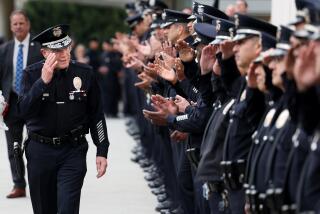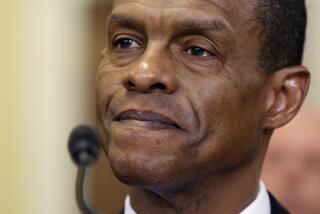Olympian Officer Wins Medals for Coaching
- Share via
DETROIT — Sprinter Darnell Hall, the youngest member of the United States’ gold medal-winning 1,600-meter relay team at the 1992 Barcelona Olympics, once felt the world was his.
Four years later, his dreams of an individual Olympic medal were shattered when a hamstring cramp knocked him out of the 400-meter trials. He walked to the finish line.
While others ran in Atlanta, Hall spent that August drinking tequila. In 1998, his Asics endorsement contract expired. Burned out from years of training and injuries, he left the sport.
Now he’s back--a Detroit police officer and track commissioner for the Detroit Police Athletic League. Using a homemade formula to tap into his young athletes’ potential, the 29-year-old Hall teaches four Ds to succeed--determination, desire, discipline, dedication.
“You may have a gold medalist coach, but when that gun goes off, it’s all about you,” Hall tells his young sprinters. “It’s just you against the world.”
Using techniques he developed as a world-class athlete, Hall coached 50 runners this summer, preparing them for regional competition.
Dwoyne Danner, 15, says Hall never shouted at the kids. “When we don’t pay attention, he’d make us run more laps.
“He taught us how to run relays and how to keep our form when we’re running,” adds Dwoyne’s 10-year-old brother, Thomas Gates Jr.
Hall was an alternate on the U.S. 1,600-relay team in Barcelona. He didn’t run in the finals but won a gold medal for helping get the team through the heats.
Four years later, he felt fast and confident heading into the Olympic trials. Then his hamstring seized up and his dreams evaporated.
“You’re used to being on a pedestal and all of a sudden, you’re a normal person,” he says. “You get so wrapped in the hype that you forget who you truly are.”
With a wife and young daughter to support, a drifting Hall felt empty and unfocused. PAL filled the void. For Hall, who played football in the police league 20 years ago, heading PAL’s track program was a homecoming of sorts.
Hall remembers as a kid growing up in a tough Detroit housing project, how a PAL volunteer coach would pull up in his green van and take Hall and other kids to their competitions.
He credits running with keeping him from falling through the cracks. He discovered his potential in his junior year of high school when he became a 400-meter state champion. He broke the state indoor 400 record his senior year.
When his running career ended, Hall found it fairly easy to make the switch from athlete to officer. He had already studied criminal justice at a Texas junior college.
“It wasn’t really a change,” he says. “It’s something you said you would do 10 years ago and all of a sudden, you’re doing it now. So it’s almost like a smile on your face.”
He was assigned to PAL after completing police academy training last October.
“Because Officer Hall knows the sport and he knows it well, he’s able to see the kids’ strengths and weaknesses and can work with them on it,” says Sgt. Allison Walker, who oversees the PAL programs.
Hall has the Olympic rings tattooed on his left arm but often conceals his Olympian status to PAL youths. His goal, he says, is just to coax the best out of the kids he coaches. He hopes to see U.S. track athletes eventually gain the kind of adulation now reserved for basketball, football and baseball stars.
“Track is not that sport that’s going to get you out of the ‘hood--out of the circumstances you were raised,” he says.
Hall says he’s managed to block his past in competitive track and field from his mind, focusing instead on training young hopefuls. But while watching the Olympic trials in July, he says, he was so overcome with memories of his failed effort in 1996 that he wept at work the next day.
“I wasn’t just a person who had his foot in the door. I was in the door and that should have been me out there,” he says.
But he says he’s no longer bitter and planned to watch the 2000 Sydney Games. He insists he’s content dreaming for others.
“To be realistic, I was meant to do what I’m doing,” he says.
Hall knows the sport didn’t stop in its tracks when he did. Now, for him, it begins afresh every day when he steps out onto the track to coach PAL kids.
“Keep the hunger,” he tells them. “You’re hungry when you don’t have it and when you get it, you tend to relax. Don’t relax.”
More to Read
Go beyond the scoreboard
Get the latest on L.A.'s teams in the daily Sports Report newsletter.
You may occasionally receive promotional content from the Los Angeles Times.






